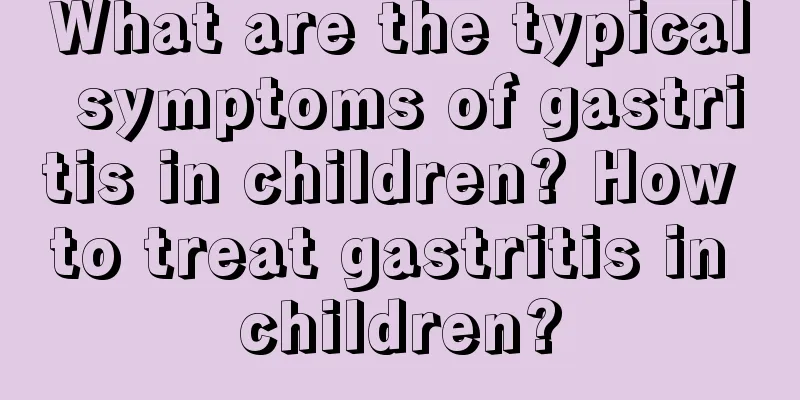Is there any relationship between baby spitting up and crying? Will crying cause spitting up?

|
Is there any relationship between baby spitting up and crying? Some babies will spit up milk after crying, so will spitting up milk cause the baby to cry? Is there any direct influence and relationship between crying and baby spitting up milk? Let's introduce to you the impact of baby crying and the problem of spitting up milk. Is there any relationship between baby spitting up and crying?If the baby is always crying, it will definitely lead to spitting up milk. Don't feed the baby too much every time, because the baby is still young and the stomach is relatively small. If the baby eats too much and cries, he will of course spit up milk. You can pat the baby on the back after feeding, which can reduce the number of spitting up milk. The baby may spit up milk and cry because he inhaled too much air while feeding, and spit out milk when burping. Of course, it may also be because he is too full. Why does the baby spit up milk when crying?The stomach has two doors, one connected to the esophagus is called the cardia, which is the entrance of the stomach, and the other connected to the intestine is called the pylorus, which is the exit of the stomach. The cardia of infants and young children is relatively loose and not tightly closed, so it is easy to be washed open by food. When there is a little more food in the stomach, it will break open the cardia and flow back into the esophagus. The pylorus is tightly closed and is easily stimulated by food and spasms, making the exit resistance greater, making it slow or difficult for food to pass through. Food will flow back from the pylorus to the cardia, break out of the door, and the child will spit up milk. In addition, the baby's stomach is horizontal, with a small capacity, which means less food can be stored and it is easy for the milk to return to the cardia. Even under normal circumstances, if the baby eats too much and lies flat immediately after feeding, the milk can easily break through the cardia and return to the mouth through the esophagus, causing vomiting. If the child spits up milk occasionally and is in good spirits, there is no need to be nervous. If the child spits up every time he is fed and the amount of vomited milk is relatively large, there may be problems with the gastrointestinal tract itself, or there may be lesions in other systems. The child should be taken to the hospital for examination. Spitting up milk is the most common problem in infants, especially in infants under six months old. This is because the infant's muscles are not yet developed enough, the contraction force is not strong enough, and the stomach and esophagus cannot be closed tightly. At the same time, the position of the infant's stomach is not tilted, but almost horizontal, so the milk is easy to flow to both ends, especially when there is too much milk in the stomach or the activity is intense, it is more likely to flow to both ends and cause vomiting. Diseases that cause spitting up in newborns1. Amniotic fluid aspiration: Due to the large amount of amniotic fluid aspiration, it has a certain irritating effect on the stomach. Newborns often vomit soon after birth, spitting out clear water, mucus or a small amount of bloody fluid, but are generally in good condition. For frequent vomiting caused by amniotic fluid aspiration, 1% soda water can be used for gastric lavage. 2. Pyloric spasm: In the neonatal period, due to temporary pyloric dysfunction, jet-like vomiting often occurs shortly after feeding. Clinically, a large amount of milk and milk clots are often vomited, and the condition is sometimes better and sometimes worse. For pyloric spasm, 1:1000 atropine can be dripped into the mouth 5-10 minutes before feeding, starting with 1 drop and gradually increasing. The maximum amount should not exceed 4 drops until the child's face turns red. Generally, significant therapeutic effects can be achieved. 3. Neonatal constipation: Neonates generally begin to excrete meconium within 10 hours after birth. If there is very little bowel movement or the time for meconium excretion is significantly prolonged in the first few days after birth, abdominal distension and vomiting may also occur clinically. For neonatal constipation, normal saline enema can be used. Once the bowel movement is smooth, abdominal distension and vomiting are often relieved. 4. Infection factors: This is the most common cause of neonatal vomiting. In addition to digestive tract infections such as epidemic diarrhea and hepatitis, infections outside the digestive tract such as otitis media, pneumonia, sepsis, meningitis, etc. are also common causes of neonatal vomiting. It is worth mentioning that digestive tract malformations often play a role in the onset of neonatal vomiting, and the harm is extremely great, so we should pay special attention to it. Spitting up milk is not necessarily a disease, it may also be due to improper feeding posture. New parents often make the mistake of improper feeding. It is very important to learn the correct feeding knowledge and how to let the baby adopt the correct sleep method after feeding. Have you learned the above and correctly deal with the problem between crying and spitting up milk? |
<<: What children eat can improve their academic performance
>>: What should I do if my baby spits up yellow milk? Will my baby spits up yellow milk?
Recommend
Is Shuke toothpaste a Chinese product? How is Shuke toothpaste?
Toothpaste is used every day, and every time you ...
What should you pay attention to when recovering after childbirth? 3 key parts of postpartum care
Postpartum recovery is not only about losing weig...
Can you rock a newborn baby? The correct way to hold a newborn baby
How to hold a newborn baby is the most basic thin...
What causes hair loss during pregnancy? What to do during pregnancy
There are already a lot of things added to the pr...
Can a baby's cough from choking on milk cause pneumonia? Early symptoms of choking on milk pneumonia
If the mother feeds the baby in an improper postu...
Is the pregnancy test stick disposable? It is definitely disposable.
Many people have never seen or used a pregnancy t...
How long does it take for the baby in the belly to hear sounds? Will the baby in the belly smile bitterly?
How much do you know about pregnancy? Today, let&...
Why can't cod liver oil be taken for a long time? What is the difference between cod liver oil and deep sea fish oil?
Cod liver oil is a nutritional supplement. Genera...
Happy Baby Xibei rice noodles are real or fake. How to identify the real and fake Xibei rice noodles?
Happy Baby Rice Noodles is a long-established Ame...
What fruits can children eat when they have a cough? What fruits are best for children when they have a cough?
It is a common phenomenon for children to cough, ...
What can baby rice cereal be used for? Tips on how to choose baby rice cereal
Baby rice cereal is very nutritious. It can help ...
How to make your baby develop a habit of drinking water? What are the functions of a children's smart water cup?
Drinking water for babies has always been a heada...
What characters should be avoided when naming a baby girl? How to name a baby girl based on her birth date?
There are many ways to name a baby. Every family ...
Should baby eczema be kept dry or moist? How many months will it take for baby eczema to stop growing?
Baby eczema is also a common skin problem. Most o...
Bedtime story for children in the Year of the Monkey: Monkeys also have dreams
Everyone has his or her ideals, even babies have ...









